Supreme Court Appeal - Appendix 5
(Expert Opinion from Professor Ashton)
Notice
I arranged to have these letters were translated whilst evacuating from Fukushima during the 3/11 disaster.
Therefore, there was little opportunity to check them and there may be some unnatural usages of Japanese (in original Japanese version). If in doubt, please refer to the original English document.
Appendix 5A
Tue, Feb 15, 2011
Dear Wayne,
I am sorry you are still having difficulties with the judiciary. Benzodiazepines affect the whole nervous system, both the central nervous system and the autonomic (sympathetic and parasympathetic) nervous system which is controlled by the CNS. The initial effect is to decrease nervous system activity but with regular use, the whole system becomes hyperactive due to the development of tolerance. This is manifested by the withdrawal reaction if the drug is stopped, the dosage reduced, or even while benzos are still being taken.
Examples of hyperactive autonomic nervous disorder during the benzo withdrawal reaction include palpitations, rapid heart rate, panic attacks, insomnia, excitability, restlessness, muscle tremor and jerks, sweating, night sweats, blurred or double vision, tingling, feeling of skin crawling, hypersensitivity to light, sound, taste and smell , increased susceptibility to stress and others.
I could be more specific in your case if you would supply a brief history and description of your symptoms before, during and on withdrawal of your benzodiazepines.
I will send a list of references tomorrow.
Best wishes,
Heather Ashton
Top of Page
Appendix 5B
Tue, Feb 15, 2011
Please find attached some references. Heather
References
- Ashton, H. (2004) Benzodiazepine dependence. In Haddad P, Dursun S, Deakin B. Adverse Syndromes and Psychiatric Drugs: A Clinical Guide. Chapter 13. pp. 239-259. Oxford Medical Publications, Oxford University Press.
- Ashton H (1991) Protracted withdrawal syndromes from benzodiazepines. J Subst Abuse Treat. 8, 19-28.
- Ashton H (1995) Toxicity and adverse consequences of benzodiazepine use. Psychiatr Ann 15; 158-165.
- Busto U, Sellers EM, Naranjo CA et al. (1986) Withdrawal reaction after long-term therapeutic use of benzodiazepines. New Engl J Med 315; 654-9.
- Murphy SM, Owen RT, Tyrer PJ. (1984) Withdrawal symptoms after six weeks treatment with diazepam. Lancet 2, 1389.
- Petursson H, Lader MH. (1981) Withdrawal from long-term benzodiazepine treatment. BMJ 283; 634-5.
- Tyrer P, Rutherford D, Higgitt T. (1981) Benzodiazepine withdrawal symptoms and propranolol. Lancet 1, 520-2.
- Tyrer P, Owen R, Dawling S. (1983) Gradual withdrawal of diazepam after long-term therapy. Lancet 1, 1402-6.
Top of Page
Appendix 5C
Wed, Feb 16, 2011
Dear Wayne,
I got your symptoms history – thank you very much.
I can’t think of much more to add to the information I sent you already. Most references on benzodiazepines do not actually mention “autonomic nervous system” because it is so obvious to medical readers.
Perhaps the following statements might be of some help:
Any textbook of physiology will show that the autonomic nervous system (sympathetic and parasympathetic) affects almost every organ in the body. For example increased activity affects:,
Glands – e.g. sweat glands causing increased sweating, apocrine glands in the armpits, increased secretion of a thick odorifous substance
Heart – increased heart rate and palpitations
Muscle – increased tone causing stiffness, muscle jerks, muscle pain etc.; eye muscles causing blurred vision
Lungs – shortness of breath
Skin – hot and cold feelings, and flushes
Gastrointestinal system – loss of appetite, stomach pains.
Reference: Guyton AC. Textbook of Medical Physiology (1986) 7th edition. Saunders & Co. Philadelphia. (Japanese – 4th edition, Tokyo.
Nearly all Wayne Douglas’s symptoms during benzodiazepine treatment, dosage reduction and withdrawal (recorded in Dr. Judson’s report) are due to dependence and symptoms of autonomic overactivity, which is common in these circumstances. There was no evidence in the report of autonomic nervous disorder prior to taking benzodiazepines, apart from a mild episode of physiological stress which settled spontaneously after Mr. Douglas changed jobs in March 2000. The episode of vertigo in May 2000 was undoubtedly due to a vestibular neuronitis which is usually caused by a virus.
Best wishes,
Heather Ashton
Top of Page
Appendix 5D
Wed, Feb 23, 2011
Dear Wayne,
As far as I know the DSM IV criteria for substance dependency is fully accepted and widely used in the UK and USA. The diagnosis of dependence requires three or more of the criteria to be fulfilled for at least a 12 month period. You fulfilled five out of these criteria.
The term “autonomic nervous disorder” in the western world usually refers to hypofunction of the system due to very many causes including neurological diseases. I can find no reference in which hyperfunction of the autonomic system, as occurs in anxiety and benzodiazepine withdrawal, is referred to as “autonomic nervous disorder”.
The activity of the autonomic nervous system is normally increased by stresses, both physical and mental but reverts to normal activity when the stress is removed. Only when the overactivity of the autonomic nervous system persists in the absence of stress could this state be considered as a disorder. In your case, the symptoms of increased autonomic nervous system activity subsided when the stress was removed. As far as I can see there was no question that you had an autonomic nervous disorder prior to taking benzodiazepines; your autonomic nervous system was merely responding in the normal and physiological way.
The autonomic nervous system responds to anxiety and stress from any cause. Benzodiazepine tolerance, dependence and withdrawal all cause stress and anxiety, so the response of the autonomic nervous system is the same as its response to any other type of anxiety. However, during long-term benzodiazepine use the stress/anxiety is continued for months or years and so the symptoms of autonomic nervous system activity also continue.
In case the court is interested, the mechanism of action of benzodiazepines is to increase the activity of GABA (gamma-aminobutyric acid), a neurotransmitter in the brain which acts to induce relaxation and calmness. When tolerance to this action develops, the receptors for GABA decrease (down-regulate), and GABA activity decreases, resulting in anxiety (and increased autonomic activity) which is further increased by dose reduction and withdrawal.
I am sorry but that is the best I can do to answer your questions. I am afraid the Japanese lawyers/judges do not understand the physiology of the autonomic nervous system!
Best wishes,
Heather
Top of Page
Appendix 5E
Thu, Mar 17, 2011
Dear Wayne,
So glad that you survived the quake.
I am sorry if my comments were misleading.
I meant exactly what I said in regard to autonomic hypo- and hyper function. Autonomic nervous disorder refers to hypofunction. For example, people with this disorder faint when they stand up because the ANS does not kick in to counter the change in gravity. Consequently their blood pressure falls, causing fainting. This disorder describes various degrees of autonomic failure, often caused by neurological disease.
In contrast, stress conditions (including benzo withdrawal) normally cause increased activity of the ANS. But this hyperfunction is normal and not considered an autonomic nervous disorder.
“…there was no question that you had ..” I meant this to mean that it was out of the question that you had an autonomic nervous disorder prior to taking benzos i.e you could not have had it and it does not merit further consideration/is not an issue.
Best wishes,
Heather
Top of Page
Appendix 5F
Fri, Feb 18, 2011
Dear Professor Ashton,
I cannot begin to tell you how much I appreciate what you have done for me.
I am sorry for the delayed reply, but I was in Tokyo all day yesterday lodging my application to the Supreme Court.
I do not expect to win, mainly due to apparent prejudice, but I feel a sense of obligation both to myself and to the greater community at large.
Thank you so much once again.
Kind Regards,
Wayne
Sat, Feb 19, 2011
Dear Wayne,
Thank you for your kind words. I hope your case goes well.
Ray Nimmo and I are still open to a Japanese translation (in pdf), which may help to enlighten the Japanese people, many of whom must be suffering as you did. There was a Japanese lady who started to translate some of it, but it has fallen through.
Best wishes and good luck.
Heather
Top of Page
Notice
- The above and below are making reference to the translation of The Ashton Manual, which was publically released on August 19, 2012 (See Yomiuri Newspaper article). The manual was eventually translated by a Japanese man, who suffered from dependency himself, realizing the need for the medical community and the general public to be better informed about the dangers. His translation of the manual was later proofread by Japan expert Dr. Hirokuni Beppu who commented in my Japan Times article along with Prof. Ashton.
- I was honoured to have the opportunity to become acquainted with these people through sharing a common cause. I was also privileged to work together on the finalization of the above translation where my role was basically to help clarify any subtle differences arising from the inferences / nuances etc and to assist in communications with Prof. Ashton.
Appendix 5G
Wed, Apr 27, 2011
Dear Wayne,
I hope you are well and that the earthquake has not delayed your court case.
I am writing because I have had 2 other offers to do a Japanese translation of the manual. There is also a Japanese who wants to translate the Supplement to the manual which I have recently written (http://www.benzo.org.uk/ashsupp11.htm)- also available on the benzo site www.benzo.org.uk.
The offers are from Japanese people who have had bad experiences from benzo use and one counsels people in benzo withdrawal. Unfortunately their English is not very good and none of them has such a deep understanding of benzos as you do.
So I am writing to ask if you are still willing to do the translation of the manual , and possibly the supplement as well (it is quite short), and whether you have made any progress with it?. Also, do you know any bilingual dr or medical expert who could check it over?- or indeed who could translate- it if you are for any reason unable to.
Japan apparently has a very high rate of benzo prescriptions and a high use of potent benzos such as Xanax, and the doctors prescribe too much and for too long - so the Japanese people deserve to have access to the manual and supplement.
Best wishes, Heather
Top of Page

The primary language of this website is English. Japanese appears as translations only (except for some original court documents).
These translations have been done by many different translators including me. Therefore, there are differences in quality and styles.
Please understand that I am not native Japanese and subsequently there are parts that may sound unnatural in Japanese.

Some parts of this website still have not been translated into Japanese. If anyone (native Japanese) would like to help on a volunteer basis, please contact mentioning the part you would like to translate. Thank you.

This website has been constructed by me personally for the purpose of raising awareness about doctor induced benzodiazepine drug dependency and litigation problems.
The purpose of this site does not include any form of retribution. Also, for privacy reasons the defendants’ names along with certain other names have been omitted from all public documentation contained herein.
There are no other persons / parties involved and it in no way represents any organization or activist type movements.
It is not intended as medical or legal advice – please see Disclaimer.
According to The International Narcotics Board 2010 Report, Japan has the highest average consumption rate of “anxiolytic” benzodiazepines in Asia with the only exception being Iran (See Figure 20 on page 35).

Although use for this indication is lower than in many European countries, Japan has the highest average consumption rate of “sedative-hypnotic” benzodiazepines in the world with the only exception being Belgium (See Figure 26 on page 39).
The Ashton Manual contains expert advice on benzodiazepines and how to withdrawal written by world renowned expert Prof. Heather Ashton.

The withdrawal schedules provided in the manual are only intended as "general guides". Each person's experience of withdrawal is unique and the course of withdrawal depends on many factors.
Don’t think benzos are dependence forming on prescription doses?
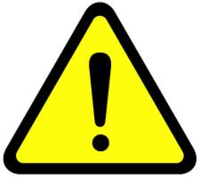
Think again!
“Tolerance and dependence can develop if benzodiazepines are used regularly for longer than 2-4 weeks. There is no minimum dose, for example tolerance and dependence have been observed after the regular use of 2.5-5mg of diazepam.”
Professor Heather Ashton: Emeritus Professor of Clinical Psychopharmacology, University of Newcastle upon Tyne, England
Stevie Nicks: Tell me Lies
Doctor: Benzodiazepines will help to calm you down and keep you from going back to coke…

"Singer Stevie Nicks has publicized the dangers of Klonopin (benzodiazepine) by describing her own detox from the prescription drug as "hellish" and worse than withdrawing from cocaine or heroin.
"Klonopin turned me into a zombie,” she told US Weekly in 2001.

You may be interested to see the notes on corrections of Japanese translation errors, which were contained in the dependency medical report translations, together with explanations of the nature of these errors, and consider their potential implications on the case.
This is very interesting!
I went from being barely able to walk when I was on benzodiazepines to being able to squat 180kgs following abstinence and rehabilitation.

What are benzos for again?

The only time I’ve ever needed to visit a psychologist in my life was AFTER (wrongfully) being prescribed benzodiazepines…
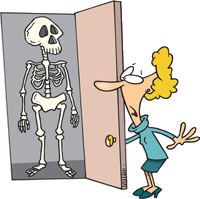
It seems the truths about the potential dangers of benzodiazepines are slowly coming out but with so many cases of prescription dependency worldwide there is clearly a long way to go.
Also, in my experience it appears as if dependency to prescription drugs leans toward a subject of taboo – almost as if society is succumbing to it.
However, is keeping these problems locked up in the closet going to help anyone or change anything?
At first it was difficult sharing my case and story online because it necessitated disclosing personal information, however, I felt the need to come out and help raise awareness outweighed this…
THE WRITING IS
ON THE WALL
for benzodiazepine use

Dr Andrew Byrne
Redfern NSW Australia
Benzodiazepine Dependence, 1997
“If any drug over time is going to just rob you of your identity [leading to] long, long term disaster, it has to be benzodiazepines.”

Dr John Marsden,
Institute of Psychiatry, London
November 1, 2007
“Benzos are responsible for more pain, unhappiness and damage than anything else in our society.”

Phil Woolas MP,
Deputy Leader of the House of Commons,
Oldham Chronicle, February 12, 2004
“The benzodiazepines are probably the most addictive drugs ever created and the vast army of enthusiastic doctors who prescribed these drugs by the tonne have created the world's largest drug addiction problem.”

The Drugs Myth, 1992
“If there's a pill, then pharmaceutical companies will find a disease for it.”

Jeremy Laurance,
The Independent, April 17, 2002.
“To rely on the drug companies for unbiased evaluations of their products makes about as much sense as relying on beer companies to teach us about alcoholism.”

Marcia Angell MD
(Former) Executive Editor New England Journal of Medicine
“It is more difficult to withdraw people from benzodiazepines than it is from heroin.”

Professor Malcolm H Lader
Institute of Psychiatry London
BBC Radio 4, Face The Facts
March 16, 1999
“Withdrawal symptoms can last months or years in 15% of long-term users. In some people, chronic use has resulted in long-term, possibly permanent disability.”

Professor C Heather Ashton
DM, FRCP,
Good Housekeeping, 2003
“Clearly, the aim of all involved in this sorry affair is the provision of justice for the victims of tranquillisers.”

Both the High Court and Supreme Court Verdicts dismissed my case completely (100%), despite the comprehensive medical reports, expert opinions, and credible evidence...

Who's protecting society (the tax payers) whose money they receive as salary to protect the public?
As someone who has experienced both doctor induced benzo dependency and the effects of the 3-11 disaster, I immediately became concerned about the overprescribing of prescription drugs to the many thousands of people in the disaster areas.
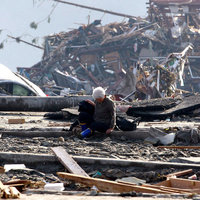
As it happened, I was writing my Supreme Court appeal in the midst of the disaster, so I took this opportunity to try and raise the alarm by including the following passage in my closing comments…
What worked well?
What didn't work so well?

For the interest of the reader, in this site I have given feedback on what worked well in my case and what could have been done better.
A lot of people were surprised that I did not bear a grudge against the prescribing doctor, but I felt anyone can make mistakes.

What got me though, was the fact he showed no remorse even after the evidence had been made clear.
The DSM-IV-TR diagnostic criteria for dependency proved to be a valuable tool in my case because it helped guide the arguments into place.

Initially the defense appeared to be dodging issues which resulted in both parties arguing on different planes.
However, once Addictive Medicine Specialist, Dr. Graeme Judson had introduced the application of the DSM-IV-TR criteria into the equation, it helped to define the arguments for litigation effectively preventing the defense from dodging issues.
(NB: There has been some controversy over the DSM, and apparently, doctors can also use these criteria to their advantage, so in my case, there was sufficient consultation with my lawyer.)
Seems people are all saying the same things over and over…

- I was like a zombie
- It felt like I was in hell
- It was much harder to come off benzodiazepines than anything else I'd ever had before
- It took a chunk of my life away
- It has destroyed my life
- The doctor never told me they were addictive / The doctor told me they weren’t addictive
- When I complained my condition was worsening the doctor prescribed me more...

Each one of us has a different experience of withdrawal.
The duration and degree of intensity can vary depending on the individual and there are many reasons for this.
The informed consent argument formed an integral part of the case because it was needed to prove negligence.

Without negligence there would have been no accountability, and therefore, no case from the outset.
In section 4 of his fourth report, Addictive Medicine Specialist, Dr. Graeme Judson explained the principles of prescribing and informed consent in relation to my case and sample applied.
The monitoring argument also formed an integral part of the case because it too was needed to prove negligence.
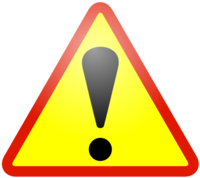
As above, without negligence there would have been no accountability, and therefore, no case from the outset.
As with informed consent, in section 4 of his fourth report, Addictive Medicine Specialist, Dr. Graeme Judson explained the principles of prescribing and monitoring in relation to my case and sample applied.

This section focuses on some of the apparent injustices of the Japanese courts in my case. To help highlight these, some parts of this section include cross-referencing between the High Court Verdict and the Dependency Reports which were all based on the official evidence and the DSM-IV-TR diagnostic criteria for dependency.

- Our key witness was twice denied the opportunity to testify – once by the Tokyo District Court and once by the Tokyo High Court.
- The Tokyo District Court judge raised an issue in the defense's favour only after proceedings had ended totally denying us any opportunity for rebuttal.
- The Tokyo High Court judge chose to use the package inserts from the drug companies to determine the amounts at which benzodiazepines could be deemed addictive, completely ignoring the extensive evidence (literature, expert opinions etc) submitted to the contrary.
- The courts made no issue over the prescribing doctor diagnosing me with one thing and treating me with drugs used for something completely different.
-
More than half the applied DSM-IV-TR diagnostic criteria for dependency were not addressed in the verdict.
- The presiding High Court judge was replaced half way through proceedings by a judge who knew absolutely nothing about the case or benzodiazepines before the verdict was delivered.
It is not uncommon for drugs in Japan to be prescribed in powder form

I was prescribed 5 different drugs, including 3 kinds of benzodiazepines mixed together in powder form (dispensed in sachets) and a tricyclic antidepressant, without being correctly informed about the drugs or the treatment.
When I returned to NZ, Addictive Medicine Specialist, Dr. Graeme Judson said “I can’t believe you made it through customs at the airport!”
Throughout this entire ordeal, I came to realize the importance of “Balance”.

As pressing as the court deadlines were and as demanding as the case was, without maintaining a balance in life including rest, recreation, work, socializing, diet, sleep etc. it would have been impossible to sustain.
However, it was always a razor edge fine line between making progress and maintaining health and balance.
Subsequently, it took a lot of skill and adapting.
Did You Know?
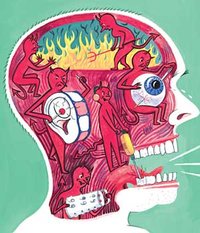
Tolerance doesn’t always develop across all symptoms.
For example, someone might develop tolerance to the hypnotic (promotion of sleep) effects but not to the anxiolytic (anxiety relief) effects, or they might develop tolerance to some symptoms of anxiety and not others. Tolerance to the various actions of benzodiazepines develops at variable rates and to different degrees (See The Ashton Manual).

When do you suppose my condition was at its worst?
- When I was experiencing moderate levels of work related stress?
- When I was working a high pressure job and involved in a rigorous court battle in another country and language against a world famous doctor, the hospital, and the teams of lawyers and entire networks that no doubt sat behind them?
The answer is A.

Why?
Because at the time of situation (B) above, I wasn’t being mislead by a doctor feeding me a cocktail of highly addictive prescription drugs.
Instead I was employing the use of practical (non-drug) stress management techniques learnt in New Zealand before I returned to proceed with litigation in Japan.
Same principles applied to coping with the affects of the 3-11 disaster...

I was warned about experiencing an inevitable down upon conclusion of my court case; much the same as what Olympians experience at the end of the games. I thought I’d be fine because I had my job and my hobbies.
However, when the time came I found myself dealing with it alone, jobless, penniless, and at one point homeless following the 3/11 disaster.
This has been an incredible challenge in itself, but as stated above, I was able to see this through without the need for drugs from misleading doctors.
A doctor that took the time to listen…

Whilst residing in state housing in Nagano, as an evacuee from Fukushima, I consulted a local ENT about ear pain from overuse of earplugs.
As we got talking he learned of my situation with regards to being displaced by the 3/11 disaster and Fukushima nuclear accident.
As a result, he also learned that I was under some stress.
However, instead of labeling me with some fancy diagnostic term and prescribing me drugs, he sat down and we discussed possible solutions as to how to I might be able to relocate, get my job back, etc.
He did this after his surgery had closed over a cup of tea – what a great doctor and what a great guy!
Cause for Alarm!

Consider this extract from:
A Review of David Healy's “The Psycho-pharmacologists III” by Professor Heather Ashton
How is it that the pharmaceutical industry has come to dominate the field?
Healy points out that drug companies “are now not simply confined to finding drugs for diseases. They have the power to all but find diseases to suit the drugs they have”.
Pierre Simon (Sanofi Pharmaceuticals) remarks: “In the beginning the pharmaceutical industry was run by chemists.
This was not so bad... Now most of them are run by people with MBAs... people who could be the chief executive of Renault, Volvo or anything.
They don't know anything about drugs.” The problem comes when a chemist presents an interesting drug to the financial analyst, who asks: “What is the market?”
The chemist has to decide for what indication the drug will be developed. If the indication is not there, it must be created.
It was difficult to get any relief from the ongoing symptoms
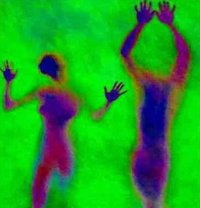
Unlike injuries where you may get some relief from adjusting your posture etc, with drug dependency in my case, the pain was both mental and physical and ran 24/7 regardless…

Ever wonder why the diazepam conversion rates differ from source to source?
Addictive Medicine Specialist, Dr. Graeme Judson explains as follows:
“The rate used for converting Diazepam equivalents tends to differ from source to source. This is because individual variation in clinical responses to “equivalent” doses can vary so close monitoring of patient response to substitution is necessary when converting from one Benzodiazepine to another.”
Many people have asked me why I fought as far as the Supreme Court of Japan and why I decided to set up this website.
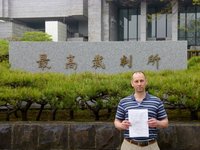
Regarding the former, I felt it was just simply wrong – people shouldn’t go to their doctor and come away suffering like that. I could see there was a significant problem in the current medical world that was affecting not only me but many others as well. I felt the problem needs to be brought to the attention of the authorities and there needs to be some accountability.
Regarding the later, knowing what prescription dependency is like, and being aware of the Effects on Us All, I felt the need to do something so that others aren’t led into suffering the same fate. This gave way to the idea of establishing this website.
Throughout this most grueling of challenges, I was always able to draw on inspiration from the All Blacks, and in particular captain Richie McCaw.

No matter how hard things got, or even when they were hard done by, they never complained and just got on with it.
AWESOME!
There were many challenges in my case.

These included fighting a world famous doctor in another country and language, acting as go-between for a harsh natured Japanese speaking lawyer and a sensitive natured English speaking doctor, making my Supreme Court Appeal whilst evacuating from Fukushima etc during the 3/11 disaster etc…
In my case, “confusion” appeared to be the main tactic of choice employed by the defense.

Enter the term “Autonomic Nervous Disorder” (The Perfect Smokescreen).
(Partial Reference: benzo.org.uk)
Journalists have regularly exposed the Benzodiazepine Scandal with stories of celebrity deaths attributed to benzo use as well as the blighted lives of ordinary people.
Benzodiazepines were, by all accounts, implicated in the deaths of:
- Elvis Presley
- Paula Yates
- Michael Jackson
- Heath Ledger
- Brittany Murphy
- Amy Winehouse
- DJ AM (a.k.a. Adam Goldstein)
- Anna Nicole Smith
- Margaux Hemingway
- Don Simpson
- David Foster Wallace
- Whitney Houston

I Will Always Love You
How anti-anxiety meds are killing celebrities
It used to be that hard drugs were the cause of celebrity overdoses…Of the celebrities who have overdosed on drugs in the past five years, eight appear to have taken prescription medications — specifically, a mix involving easily accessible anti-anxiety medications known as benzodiazepines or “benzos.”
Below are some of the skills I needed to call upon in my case, however, unlike my case where I was required to play an active role between two countries and languages, not all cases may require such input from the claimants.

- Analytical
- Language
- Translation
- Communication
- Cross cultural
- People
- Negotiation
- Coordination
- Research
- Formal writing
- IT
- Computer
- Stress management
- Time management
- Money management
- Health maintenance
- Self awareness
- Adaptation
- Flexibility
- Endurance
- Control
- Drive
- Belief
- Commitment
- Sacrifice
For many months and years I had to endure the effects and suffering of a horrible benzodiazepine dependency.
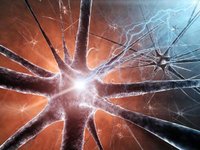
During my quest to seek recognition for this, I thought the defendant hospital, doctor and courts had a lot of nerve to turn around and tell me that I wasn’t dependent (despite having attended a drug rehabilitation program with follow-up consultations lasting more than a year)...
I included the quote in the top left corner of this site because many people thought I was crazy for pursuing my case.

However, my philosophy is we can either choose to do something, or choose to do nothing. The former gives way to hope for many people. The latter…? Whichever way, it’s all in our hands…
I first became acquainted with Prof. Ashton when my lawyer and I were desperately seeking literature stating that a patient can experience withdrawal symptoms even while still taking the drugs.
She subsequently provided this key information and later other useful information as well.
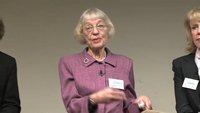
We maintained close contact ever since; making efforts to raise awareness about this massive social problem.
This work included the translation of The Ashton Manual in Japanese.
This section shows a variety of other benzodiazepine related videos that may be of interest.

This page has been set up to give readers the opportunity to share their comments.

If you wish to send a message of your own please do so by sending an email through the contact page.
Alternatively, you can use the Benzo Case Japan facebook page.
The amount of actual loss and damages in my case can be seen in the Official Loss and Damage Forms which are registered with the courts.

My Official Court Statement 2 may help give an idea of the nature of some of these damages.











